Are you struggling with flies buzzing around your trash cans? Flyermedia.net presents practical strategies on How To Keep Flies Away From Trash Cans, employing methods to eliminate current fly problems. Discover how to prevent them using preventative measures, while reducing your carbon footprint and creating a healthier environment. Let’s explore ways to deal with fruit flies, house flies, and other flying insects around trash cans.
1. Why Do Flies Swarm Around Trash Cans?
Flies are attracted to trash cans due to the odors emanating from decaying organic matter. According to research from Penn State Extension, a single female fly can lay hundreds of eggs, and under ideal conditions, these eggs can hatch into flies within a few days. The smells of rotting food, particularly fruits, vegetables, and meat, provide a perfect breeding ground for flies. These odors attract flies because they indicate a plentiful food supply for both adult flies and their larvae. Therefore, reducing these odors is crucial in keeping flies away from trash cans.
2. How Can Cleaning Your Trash Can Help Keep Flies Away?
Cleaning your trash can is a simple yet effective method for how to keep flies away from trash cans. Flies are attracted to the smells of decay, so removing these odors can significantly reduce their interest in your trash bin. Regularly cleaning your trash can involves a few easy steps:
- Empty the Trash Can: Remove all trash and debris.
- Rinse with Water: Use a hose to rinse out any remaining residue.
- Apply Cleaning Solution: Mix water with white vinegar in a spray bottle.
- Scrub Thoroughly: Scrub the inside of the can and the lid to remove any stuck-on waste.
- Disinfect: Use a disinfectant spray to kill bacteria and remaining odors.
- Dry the Can: Allow the can to dry completely in the sun.
- Add Baking Soda: Sprinkle baking soda at the bottom to absorb future odors.
This routine will eliminate the smells that attract flies, making your trash can a less desirable location for them.
3. Does Airflow Really Help in Keeping Flies Away From Trash Cans?
Yes, airflow is an effective, yet often overlooked, method for how to keep flies away from trash cans. Flies struggle to fly in strong winds, making it difficult for them to access and linger around your trash cans. You can use a simple box fan to create a constant breeze around your trash area. Place the fan near the trash cans and set it to a high setting. This constant airflow deters flies from landing and breeding in the vicinity. Additionally, the cool air from the fan can also help reduce odors, further discouraging flies.
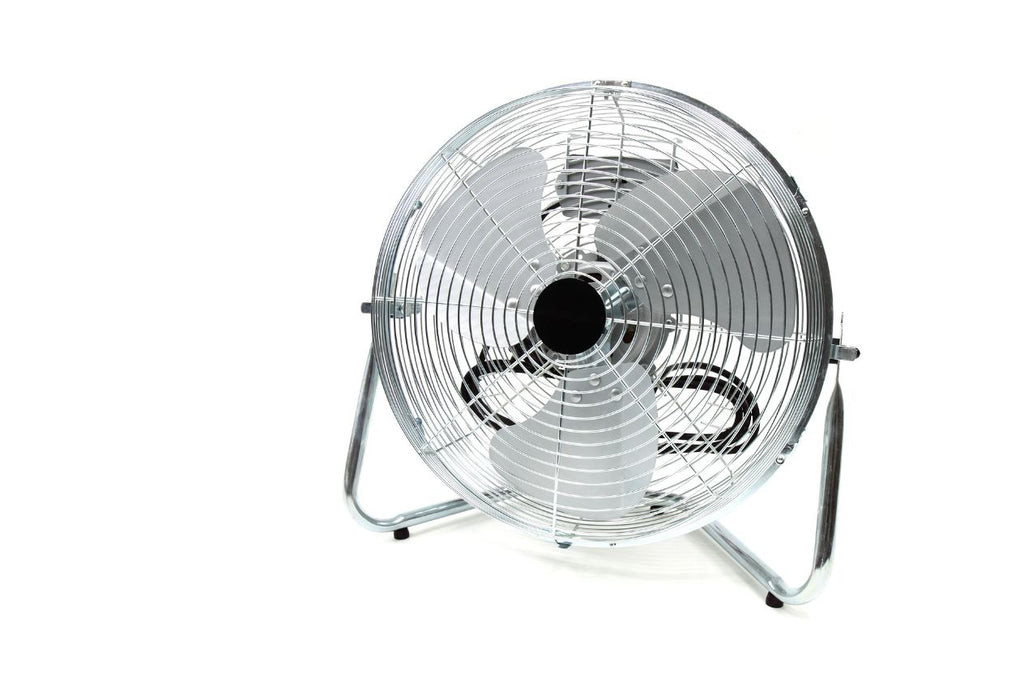 silver fan against a white background
silver fan against a white background
4. How Can Ginger Spray Be Used to Deter Flies From Trash Cans?
Ginger spray is an effective and natural solution for how to keep flies away from trash cans. Flies are repelled by the strong, spicy scent of ginger. To make ginger spray:
- Mix Ginger Powder with Water: Mix two tablespoons of ginger powder with one cup of hot water.
- Let it Sit: Allow the mixture to sit for about 30 minutes.
- Strain the Mixture: Strain the mixture to remove any solid particles.
- Pour into a Spray Bottle: Pour the liquid into a spray bottle.
- Spray Around Trash Cans: Spray the solution liberally around your trash cans, especially on and near the lid.
The potent scent of ginger will deter flies from approaching the area, making it an excellent natural fly repellent.
5. How Can I Make an Eco-Friendly Fly Killer for My Trash Area?
Creating an eco-friendly fly killer is a responsible method for how to keep flies away from trash cans without harming the environment. A popular DIY solution involves using essential oils, which are naturally repellent to flies. Here’s how to make it:
- Gather Ingredients: You will need a spray bottle, 2 oz of hot water, and 10 drops of lemongrass essential oil (or other fly-repelling oils like peppermint, eucalyptus, or lavender).
- Mix Ingredients: Combine the hot water and essential oil in the spray bottle.
- Shake Well: Ensure the mixture is well combined by shaking the bottle vigorously.
- Spray Around Trash Cans: Spray the mixture directly onto flies or around your trash cans.
This natural spray is safe for your family and pets while effectively deterring flies.
6. Is Chemical Bug Spray a Viable Solution to Keep Flies Away from Trash Cans?
Yes, chemical bug spray is a viable, albeit more aggressive, solution for how to keep flies away from trash cans. Bug sprays containing permethrin or similar insecticides are effective at killing flies on contact. However, it is crucial to use these sprays with caution:
- Read Instructions: Always read and follow the manufacturer’s instructions.
- Spray Sparingly: Use the spray sparingly to avoid excessive chemical exposure.
- Ventilate the Area: Ensure the area is well-ventilated during and after application.
- Avoid Contact: Keep children and pets away from the sprayed area until it is dry.
While effective, chemical bug sprays should be used as a last resort due to their potential health and environmental impacts.
7. What Are Fly Traps, and How Effective Are They for Fly Control Around Trash Cans?
Fly traps are a practical solution for how to keep flies away from trash cans, providing a simple and effective way to capture and eliminate flies. These traps typically consist of sticky strips or containers baited with a sweet, attractive substance that lures flies in. Once the flies land on the sticky surface or enter the trap, they become trapped and cannot escape.
To use fly traps effectively:
- Hang Near Trash Cans: Place fly traps near your trash cans where flies are most active.
- Replace Regularly: Replace traps when they become full or lose their stickiness.
- Consider Bait: For container traps, ensure the bait remains effective by replenishing it as needed.
Fly traps are a non-toxic and easy-to-use option for managing fly populations around trash cans.
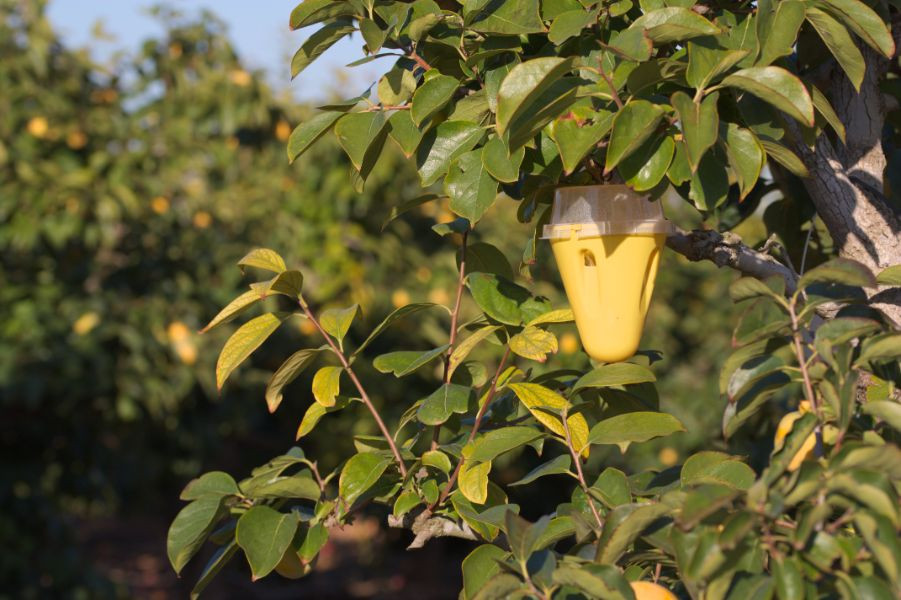 Fly trap hanging from a tree
Fly trap hanging from a tree
8. How Can Garbage Guards Help in Preventing Flies Around Trash Cans?
Garbage guards offer a long-term solution for how to keep flies away from trash cans. These devices use slow-release technology to emit an odorless vapor of insecticide that kills flies and other insects. A garbage guard is typically attached to the inside of the trash can lid, where it releases a continuous vapor for up to four months.
To install and use a garbage guard:
- Clean the Lid: Ensure the inside of the trash can lid is clean and dry.
- Attach the Guard: Peel off the adhesive backing and attach the garbage guard to the lid.
- Close the Lid: Ensure the lid is closed to trap the vapor inside the can.
- Replace as Needed: Replace the garbage guard every four months or as directed by the manufacturer.
Garbage guards provide continuous protection, making them a convenient option for managing fly problems.
9. When Should I Consider Hiring a Professional for Fly Control?
Hiring a professional pest control expert is a prudent step when dealing with severe or persistent fly infestations. If you have tried various DIY methods without success, or if the fly problem is overwhelming, a professional can provide more effective and targeted solutions.
Consider hiring a professional if:
- Infestation is Severe: You have a large number of flies despite your efforts.
- DIY Methods Fail: Over-the-counter solutions and home remedies are ineffective.
- Source is Unknown: You cannot identify the source of the infestation.
- Health Concerns: You are concerned about the health risks associated with fly infestations.
A professional pest control service can assess the situation, identify the root cause of the problem, and implement a comprehensive plan to eliminate flies and prevent future infestations.
10. How Can Lomi Help Prevent Flies By Reducing Food Waste in Trash Cans?
Lomi is an innovative solution for how to keep flies away from trash cans by significantly reducing the amount of food waste that attracts them. Lomi is an electric kitchen composter that transforms food scraps into nutrient-rich dirt in under 24 hours. By diverting food waste from your trash can to Lomi, you eliminate the primary food source that attracts flies.
Here’s how Lomi works:
- Collect Food Scraps: Place food scraps, including fruits, vegetables, coffee grounds, and even meat and dairy, into the Lomi composter.
- Run the Cycle: Select a cycle and start the Lomi.
- Transform Waste: Lomi breaks down the food waste into a soil-like substance that can be used to enrich your garden or potted plants.
By using Lomi, you not only reduce the odors and attractants in your trash can but also create a valuable resource for your plants.
 Lomi by Pela
Lomi by Pela
11. What Are the Best Practices for Preventing Flies Around Garbage Bins?
Preventing flies from infesting your garbage bins involves a combination of proactive measures. Here are some best practices for how to keep flies away from trash cans:
- Don’t Put Food Waste in the Garbage: Use Lomi or another composting method to dispose of food scraps.
- Tie Up Garbage Properly: Ensure garbage bags are securely tied to prevent odors from escaping.
- Use Biodegradable Trash Bags: These bags allow waste to dry out more quickly, reducing odors.
- Line the Bin with Newspapers: Newspapers absorb moisture and keep the bin drier.
- Try Cinnamon Oil Fly Deterrents: Spraying cinnamon oil around the bin can deter flies.
- Control Flies with Clove Oil: Clove oil is another effective natural fly repellent.
- Thyme Oil Can Repel Flies Too: Thyme oil has a strong scent that flies dislike.
- Deter Flies with Basil Leaves: Basil leaves can be steeped in water to create a fly-repellent spray.
- Keep the Area Clean: Regularly clean the area around the trash cans to remove any spilled waste.
12. How Does Using Lomi Contribute to Environmental Sustainability?
Using Lomi significantly contributes to environmental sustainability by reducing landfill waste and promoting soil health. Landfills are a major source of methane, a potent greenhouse gas. By diverting food waste from landfills to Lomi, you reduce methane emissions and help combat climate change. Additionally, the nutrient-rich dirt produced by Lomi can be used to enrich soil in your garden, reducing the need for chemical fertilizers.
According to the Environmental Protection Agency (EPA), food waste is a significant component of municipal solid waste, and reducing food waste can have substantial environmental benefits. Lomi provides a practical and eco-friendly solution for managing food waste at home.
13. What Are Some Natural Remedies to Keep Flies Away From My Trash Cans?
Natural remedies are a great way for how to keep flies away from trash cans without resorting to harmful chemicals. Here are some effective options:
- Essential Oils: Oils like peppermint, lavender, eucalyptus, and lemongrass are known to repel flies. Mix a few drops with water in a spray bottle and apply around the trash cans.
- Herbs: Planting or placing herbs like basil, mint, and rosemary near your trash cans can deter flies.
- Vinegar: Apple cider vinegar can be used as a bait to trap flies. Place a bowl of vinegar covered with plastic wrap and small holes near the trash cans.
- Citrus Peels: Flies dislike the scent of citrus. Place orange, lemon, or grapefruit peels near the trash cans.
- Cucumber Slices: Place cucumber slices near the trash cans, as flies are repelled by their scent.
These natural remedies are safe, effective, and environmentally friendly.
14. How Can I Keep My Trash Can Area Clean to Prevent Flies?
Maintaining a clean trash can area is crucial for how to keep flies away from trash cans. Regular cleaning prevents the buildup of food residue and odors that attract flies.
Here are some tips for keeping your trash can area clean:
- Regularly Wash Trash Cans: Wash your trash cans with soap and water at least once a month.
- Clean Up Spills Immediately: Wipe up any spills or food residue around the trash cans.
- Use Trash Can Liners: Use trash can liners to prevent food waste from sticking to the inside of the can.
- Store Trash Cans Properly: Store trash cans in a cool, dry place to minimize odors.
- Rinse Recyclables: Rinse out recyclable containers before placing them in the recycling bin.
- Keep Lids Secure: Ensure trash can lids are tightly sealed to prevent flies from entering.
15. What Are the Health Risks Associated With Fly Infestations Around Trash Cans?
Fly infestations around trash cans pose several health risks. Flies can carry and transmit various pathogens, including bacteria, viruses, and parasites. These pathogens can contaminate food and surfaces, leading to illnesses such as:
- Food Poisoning: Flies can transmit bacteria like Salmonella and E. coli, causing food poisoning.
- Dysentery: Flies can spread the bacteria that cause dysentery, leading to severe diarrhea and abdominal pain.
- Typhoid Fever: Flies can carry the bacteria responsible for typhoid fever, a serious infection that can be life-threatening.
- Cholera: Flies can transmit the bacteria that cause cholera, a severe diarrheal disease.
- Eye Infections: Flies can spread bacteria that cause eye infections like conjunctivitis.
To minimize these health risks, it is essential to control fly populations and maintain proper hygiene around trash cans.
16. How Often Should I Clean My Trash Cans to Prevent Fly Infestations?
The frequency with which you should clean your trash cans depends on factors such as the type of waste you dispose of and the climate in your area. However, a general guideline is to clean your trash cans at least once a month to prevent fly infestations.
If you dispose of a lot of food waste or live in a warm climate, you may need to clean your trash cans more frequently, such as every two weeks. Regular cleaning helps remove food residue and odors that attract flies.
17. Can Certain Types of Trash Cans Help Prevent Flies?
Yes, certain types of trash cans can help prevent flies by providing a barrier against them. Trash cans with tight-fitting lids are effective at preventing flies from accessing the waste inside. These lids should seal securely to prevent odors from escaping and flies from entering.
Trash cans made from durable materials such as plastic or metal are also better at preventing flies than those made from flimsy materials. These materials are less likely to develop cracks or holes that flies can use to enter the can.
18. How Do I Get Rid of Maggots in My Trash Can?
If flies have already laid eggs in your trash can, you may find yourself dealing with maggots. Getting rid of maggots is essential for preventing a full-blown fly infestation. Here are some effective methods:
- Boiling Water: Pour boiling water over the maggots to kill them.
- Vinegar and Water: Mix equal parts vinegar and water in a spray bottle and spray the maggots.
- Bleach Solution: Dilute bleach with water and pour it over the maggots. Be cautious when using bleach, as it can be harmful to the environment and should be handled with care.
- Diatomaceous Earth: Sprinkle diatomaceous earth (DE) over the maggots. DE is a natural substance that dehydrates and kills insects.
- Salt: Cover the maggots with salt, which will dehydrate and kill them.
After treating the maggots, thoroughly clean and disinfect the trash can to prevent future infestations.
19. How Can I Prevent Wild Animals From Tipping Over My Trash Cans and Attracting Flies?
Preventing wild animals from tipping over your trash cans is essential for reducing the mess and odors that attract flies. Here are some tips for securing your trash cans:
- Use Animal-Resistant Trash Cans: Invest in trash cans designed to be animal-resistant. These cans typically have locking lids and heavy-duty construction.
- Secure Lids With Bungee Cords: Use bungee cords to secure the lids to the trash cans.
- Store Trash Cans in a Garage or Shed: Store trash cans in a secure location such as a garage or shed to prevent animals from accessing them.
- Place Trash Cans on a Stable Surface: Place trash cans on a level surface to prevent them from tipping over easily.
- Use a Trash Can Enclosure: Build or purchase a trash can enclosure to protect your trash cans from animals.
By taking these steps, you can prevent wild animals from tipping over your trash cans and attracting flies.
20. What Are Some Common Misconceptions About Controlling Flies Around Trash Cans?
There are several common misconceptions about controlling flies around trash cans that can hinder your efforts. Here are a few to be aware of:
- Misconception: Flies Are Only Attracted to Rotting Food: While flies are attracted to rotting food, they are also drawn to other organic matter, such as pet waste and plant debris.
- Misconception: One Fly Is Not a Problem: A single fly can quickly become a major infestation, as flies reproduce rapidly.
- Misconception: Chemical Sprays Are the Only Effective Solution: While chemical sprays can be effective, there are many natural and non-toxic methods for controlling flies.
- Misconception: Cleaning the Trash Can Once Is Enough: Regular cleaning is essential for preventing fly infestations.
- Misconception: All Fly Traps Are the Same: Different types of fly traps are designed for different situations. Choose the right trap for your specific needs.
By understanding these misconceptions, you can make informed decisions about controlling flies around your trash cans.
Keeping flies away from trash cans is essential for maintaining a clean, healthy, and pleasant environment. By implementing the strategies outlined in this article, you can effectively manage fly populations and prevent infestations. Remember, the key to success is a combination of proactive prevention, regular cleaning, and appropriate control methods. For more information and resources on pest control and sustainable waste management, visit flyermedia.net.
FAQ: Keeping Flies Away From Trash Cans
-
Why are flies so attracted to my trash cans?
- Flies are drawn to the odors of decaying organic matter, like rotting food, which trash cans often contain.
-
How does regular cleaning of trash cans help in preventing flies?
- Cleaning removes food residue and odors that attract flies, making the environment less appealing for them.
-
What are some natural ways to deter flies from trash cans?
- Essential oils like peppermint, lavender, and eucalyptus, as well as herbs like basil and mint, can naturally repel flies.
-
Can using specific types of trash bags help keep flies away?
- Yes, biodegradable trash bags allow waste to dry out quicker, and tight-sealing bags prevent odors from escaping.
-
How does Lomi reduce the attraction of flies to my trash?
- Lomi transforms food waste into nutrient-rich dirt, eliminating the primary food source that attracts flies to trash cans.
-
What essential oils are most effective in deterring flies from trash areas?
- Peppermint, lavender, eucalyptus, and lemongrass are known for their fly-repelling properties.
-
Is it necessary to hire a professional for fly control, or can I manage it myself?
- For severe or persistent infestations, a professional can offer targeted solutions, but many DIY methods are effective for minor issues.
-
How often should I empty and clean my trash cans to prevent fly infestations?
- Aim to empty trash cans regularly and clean them thoroughly at least once a month, more often if dealing with food waste.
-
Are there specific designs or features in trash cans that can help keep flies away?
- Trash cans with tight-fitting lids and durable construction are more effective at preventing flies from accessing waste.
-
Besides controlling flies, how does using Lomi benefit the environment?
- Lomi reduces landfill waste and methane emissions, promotes soil health, and reduces the need for chemical fertilizers.
[Bài viết gốc]: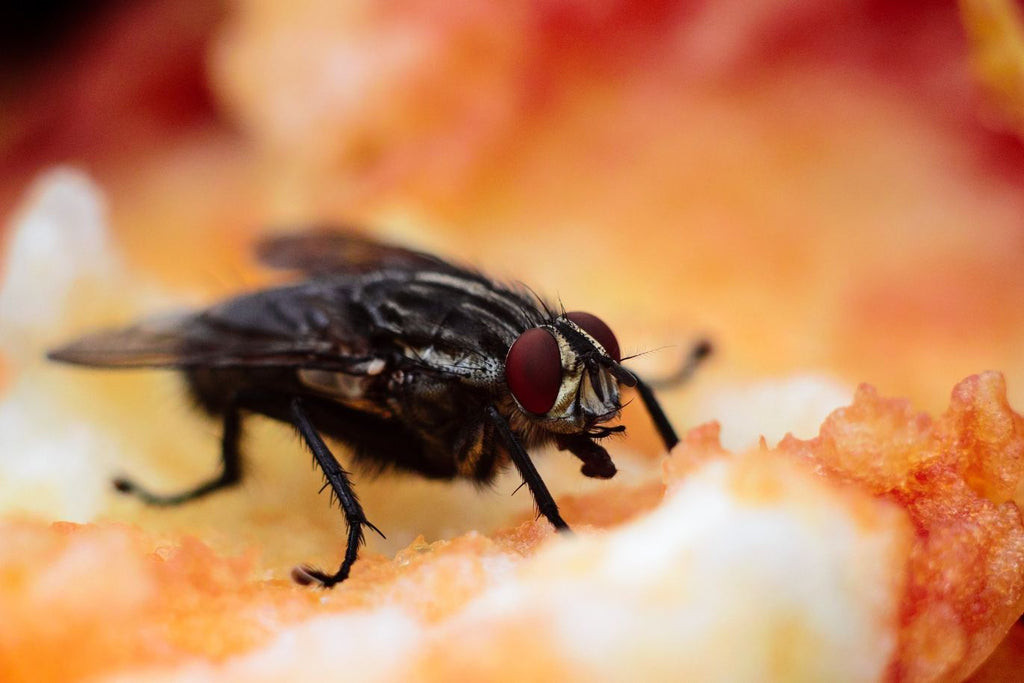 Black fly with white background
Black fly with white background
- Lomi reduces landfill waste and methane emissions, promotes soil health, and reduces the need for chemical fertilizers.
Trash day is bad enough, but when you have to deal with swarms of flies it can make the chore downright miserable. Fortunately, it’s not that hard to know how to get rid of flies around garbage bins. As an added bonus, one important method will help you keep food waste out of landfills, too! This article will explore the following topics to help you deal with flies around trash cans—and potentially help our planet in the process.
Table of contents
Dealing with maggots in your garbage can is bad enough. But when those maggots grow up and become adult flies that swarm around your face every time you take out the trash, it can be annoying—to say the least. There’s nothing that ruins a summertime barbecue like the buzzing of a fly infestation you encounter while cleaning up!
The good news is that dealing with maggots, house flies, or fruit flies around trash cans just takes a little know-how. For starters, you should understand why flies are attracted to trash in the first place. Then, you can decide whether you should take steps to prevent flies, or use methods to get rid of a current infestation. Let’s explore how to do exactly that.
Why are there flies around your trash can?
 green bin containing decaying produce
green bin containing decaying produce
A female fly is capable of laying eggs by the hundreds, and each egg can become a fly in a matter of just a few days. With an adequate food source, these eggs can become millions of flies in a very short period of time. That’s why certain smells, like decaying matter in garbage cans, serve as ideal breeding grounds for a big fly problem.
While each fly species likes to eat something a little different, house flies, black soldier flies, and fruit flies are common species known to devour food waste. Oftentimes, they’re attracted to decaying matter and the yeast cells that grow on sugary substances and fermenting or rotting fruits. Because the smell of kitchen waste will attract flies, keeping organic matter (like food) out of your trash can is one among several things you can do to get rid of flies.
How to get rid of flies around garbage cans: 8 easy methods
If you notice a swarm of flies around your trash bin, it’s time to take action. If you leave it too long, the female adult flies may lay eggs, leading to more flies and an even worse problem! That said, knowing how to get rid of flies around garbage cans can help prevent a single fly infestation from turning into several new infestations.
1. Clean your trash can and get rid of odors
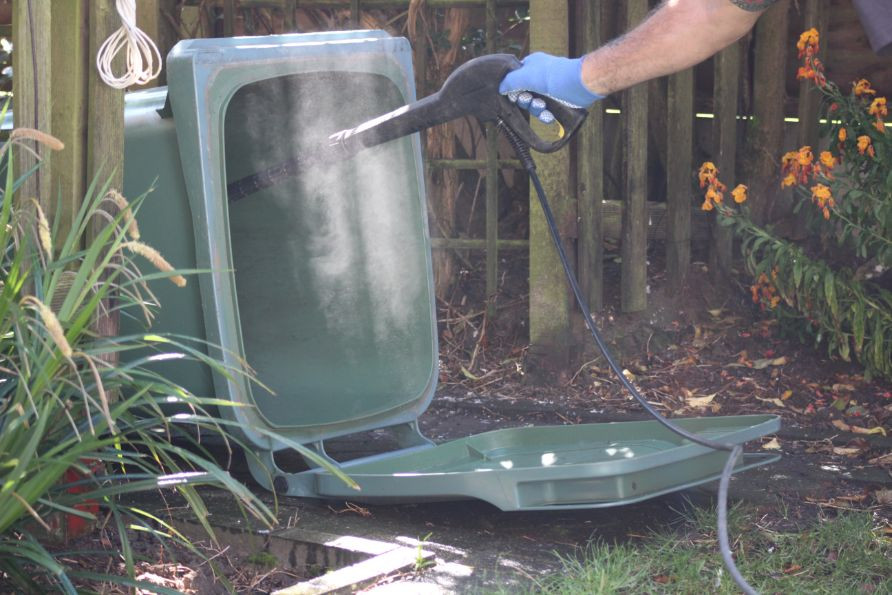 Cleaning trash can
Cleaning trash can
As explained earlier, odors of rotting meat and produce will attract flies. So, if you notice flies swarming, it’s a good sign that you need to do something about the smell of your trash can. The good news is that cleaning trash cans is a relatively simple process and can make use of products you likely have around the house.
You’ll just want to fill a spray bottle with a mixture of tap water and white vinegar. Let the solution sit for 15-20 minutes, then scrub everything down thoroughly (including the garbage lid). Once dry, sprinkle a cup or two of baking soda on the inside of the garbage bin and let it sit overnight to neutralize odors and keep flies away.
Pro tip: To maintain freshness and continue to repel flies, you might want to add baking soda every time you take out the trash. For more odor prevention, dryer sheets and charcoal can also be used.
2. Blow them away
 silver fan against a white background
silver fan against a white background
Yes, you can literally blow a group of swarming flies away from your trash can! If you keep your trash bins in a garage or a location that’s near an electrical outlet, a box fan may be your trick for how to get rid of flies around trash.
You’ll want to plug in your fan and turn it on to its highest setting to keep flies away. Because they struggle to fly in strong wind, flies won’t stand a chance against strategically placed fans. As an added bonus, the cool air will feel nice on you as you take out the summertime garbage.
Pro tip: It’s thought that using cool air (whether from a fan or your home’s AC) will do well to deter all sorts of bugs and rodents. Not only will cold air stop flies from coming where they aren’t wanted, but mosquitos, wasps, and even mice might be repelled, too!
3. Use ginger spray
 ginger root with assorted spices
ginger root with assorted spices
If you’ve eaten sushi recently, you’ll know that ginger is spicy. Flies know this, too! They can’t stand the smell of ginger. For this reason, a spray containing ginger powder can work wonders on a trash bin where flies have been spotted.
Pro tip: Because they hate the scent so much, the diluted ginger spray can be sprayed directly at swarms of flies, or liberally sprayed on and around the garbage bin.
4. Make an eco-friendly homemade fly killer
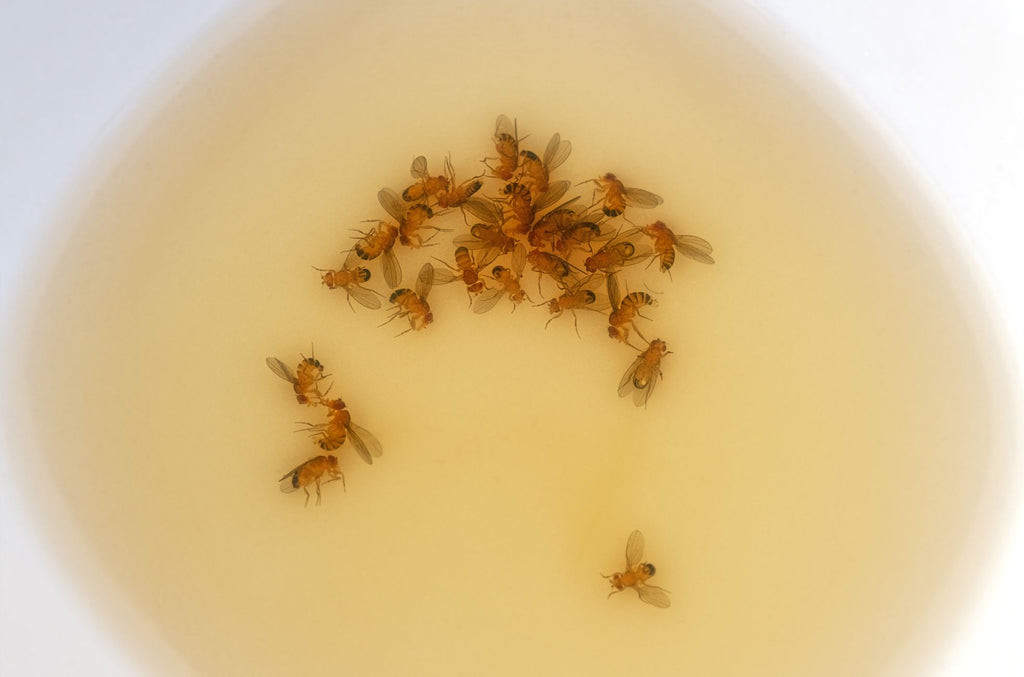 Dead flies in a liquid
Dead flies in a liquid
Especially if you have flies inside your home or near your indoor garbage bin, you can use a homemade killer spray that will be non-toxic for you and your family, but will still help to get rid of flies.
Although we may love them, flies hate some essential oils—especially lemongrass. Fortunately for us, we can add ten drops of the essential oil to a spray bottle with 2 oz of hot water. Simply shake and spray directly on the flies around your trash bin.
Pro tip: You can also drown flies by using a bowl of water, apple cider vinegar, and a drop of dish soap. The sweet smell of the apple cider vinegar will attract flies and the soap will break the surface tension of the water-vinegar mixture, causing the flies to drown once they’re lured in by the sweet scent.
5. Use chemical bug spray
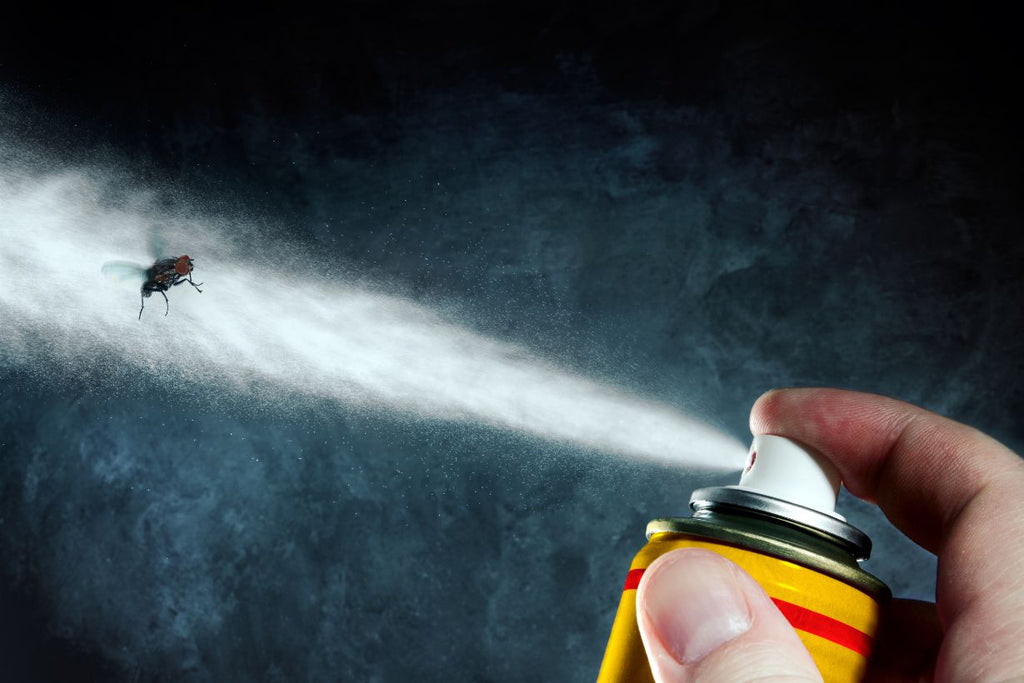 A person spraying a bug
A person spraying a bug
If you’ve had enough of flies and are ready to go to more extreme measures to get rid of them, then bug spray might be your best bet. To eliminate flies, a bug spray containing active ingredients like permethrin may be used. Just be careful, as this ingredient isn’t great for you to inhale, either!
Pro tip: If you’re all out of bug spray, some household chemicals may also do the trick. Spraying something like Windex or hairspray may also help you get rid of flies.
6. Hang fly traps
 Fly trap hanging from a treeFly traps are those adhesive strips that can be used to… you guessed it, trap flies! The sticky layer is coated with a sweet, fragrance substance that will lure in flies swarming around trash cans.
Fly trap hanging from a treeFly traps are those adhesive strips that can be used to… you guessed it, trap flies! The sticky layer is coated with a sweet, fragrance substance that will lure in flies swarming around trash cans.
Once the flies end up on the sticky flypaper, they’ll be trapped, and will eventually die.
Pro tip: Because it can take a fly up to three days to die from starvation, dehydration, or exhaustion, flypaper coated with poison may be a faster, slightly more humane way to get rid of flies around garbage cans.
7. Use a garbage guard
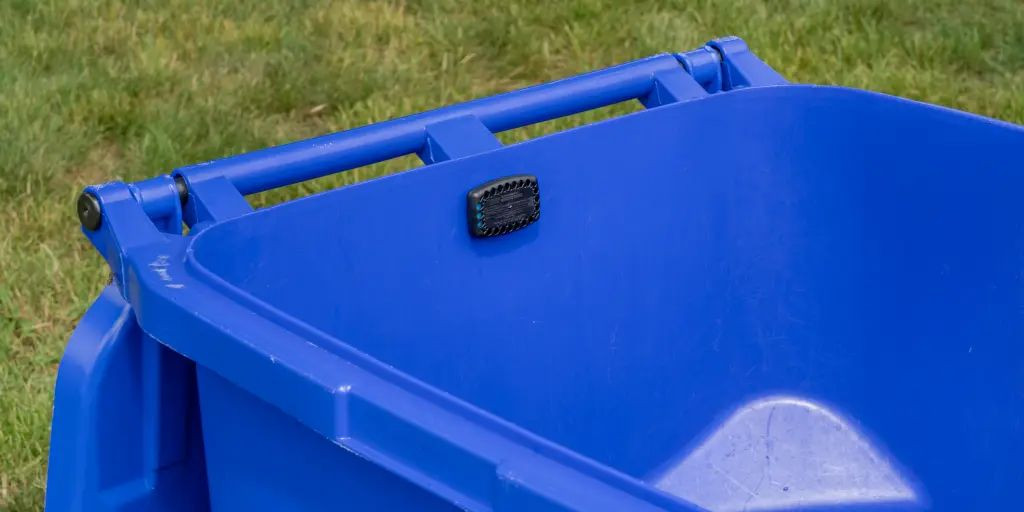 A garbage guard on a blue bin
A garbage guard on a blue bin
Image credit: The New York Times
Using slow release technology, a garbage guard insect killer will release an odorless vapor of insecticide to kill insects like flies and fruit flies. Providing long-lasting pest control, it will continue to release vapor for up to 4 months.
A garbage guard is easy to install. It has an adhesive backing that allows it to be directly attached to the trash can. Just be sure that the lid is closed and the garbage guard will continue to release the light vapor and take care of any pests or creepy crawlies that make their way inside.
Pro tip: Designed for outdoor use, it’s NOT recommended that you bring your garbage guard inside to use with an indoor trash can.
8. Get the help of a professional
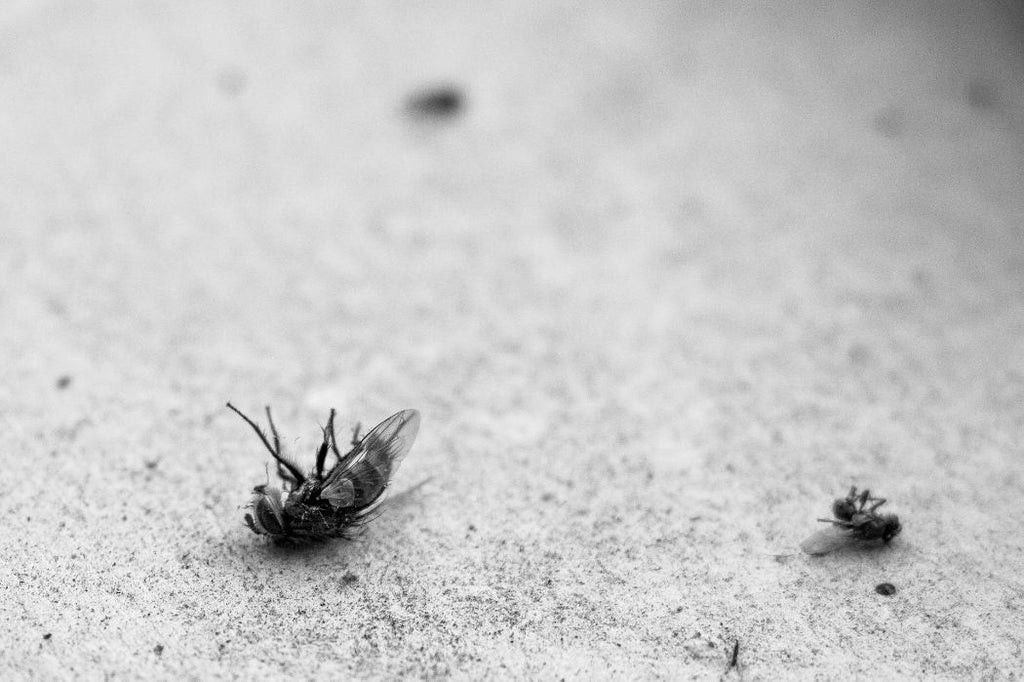 greyscale photo of two dead flies
greyscale photo of two dead flies
If things really get out of hand, you may want the support of an exterminator or professional pest control expert. Generally, they can provide a more permanent way to deal with flies around your garbage bin.
If you’re wondering how to kill flies around a trash can, or have been unsuccessful with previous attempts, don’t hesitate to call a professional. Many will offer same-day services for fly removal and some will even use eco-friendly measures to take care of your fly problems.
Pro tip: While chemicals like controlled release insecticides are available for anyone to purchase, it’s recommended that they’re only used by a licensed pest management professional. They’re commercial grade and can be dangerous if used improperly.
 Lomi by Pela
Lomi by Pela
Lomi
★★★★★
Lomi allows you to turn food waste into plant-ready nutrients in under 24 hours. Boost your plants while reducing your waste.
9 tips for preventing flies around garbage bins
 trash bag on floor next to slippers
trash bag on floor next to slippers
When it comes to keeping flies away from trash bins, one of the most important things you can do is get rid of anything that may attract pests. To stop flies before they even begin to turn your trash can into a new home, you need to make it a less attractive place for them. Remember, one fly can quickly become millions.
-
Don’t put food waste in the garbage: The best thing you can do to deter flies is to stop feeding them. Because flies love your old meat, fruit, and vegetable scraps, disposing of them in an electric kitchen food recycler instead of the trash is one of the best forms of pest control you can practice.
-
Tie up the garbage properly: A plastic bag that’s open or ripped is going to make it easier for flies to smell rotting meat or moldy bananas—and make their way inside to eat them. That said, be sure that your garbage bags are properly secured—you can even double bag if necessary!
-
Use biodegradable trash bags: Plastic garbage bags are known to trap evaporated moisture from rotting food, providing the moist conditions that flies love. Because they’re more porous, biodegradable trash bags will help the waste dry out quickly, which could keep flies at bay.
-
Line the bin with newspapers: As another way to keep your garbage drier and fly-free, newspapers can be lined at the bottom of the trash bin. They’ll soak up moisture and make it easier to clean the bin.
-
Try cinnamon oil fly deterrents: Keeping flies away from garbage bins can be beneficial for you, too! A spray containing cinnamon essential oils and water will smell warm and inviting for you, but will deter flies from gathering.
-
Control flies with clove oil: Fly deterrents that use essential oils like clove are another common way to keep the pests away from your trash. A spray containing clove can be applied in an area that might attract flies, or directly on a fly itself as an insecticide.
-
Thyme oil can repel flies too: As another way to deter flies naturally, you can spray essential oils containing thyme directly on and around your trash. The strong scent will be unappealing to the pests and will keep your trash cans free of them.
-
Deter flies with basil leaves: Fragrant basil may smell delicious to us, but we can’t say the same for flies. Steeping basil leaves in an equal amount of boiling water overnight will transform one of our favorite herbs into an essential oil that can be combined with vodka and sprayed on areas that may attract flies.
Prevent flies for good: use Lomi to dispose of food waste
 tattooed arm lifting lid of lomi electric kitchen composter
tattooed arm lifting lid of lomi electric kitchen composter
A garbage disposal isn’t always an ideal way to dispose of food scraps. In fact, there’s a lot of food that can’t properly be handled by your garbage disposal—which may result in clogs, plumbing issues, or the unsustainable incineration of waste that ends up at water treatment plants. As we mentioned before, throwing organic waste in the trash is pretty awful, too.
That being said, one of the best solutions for how to get rid of flies around garbage is to take the things that attract flies (like wasted food) and transform them to nutrient-rich dirt that can support our planet, instead of harming it. A connected food recycler like Lomi is a no-fuss way to sustainably transform food scraps into something useful for
